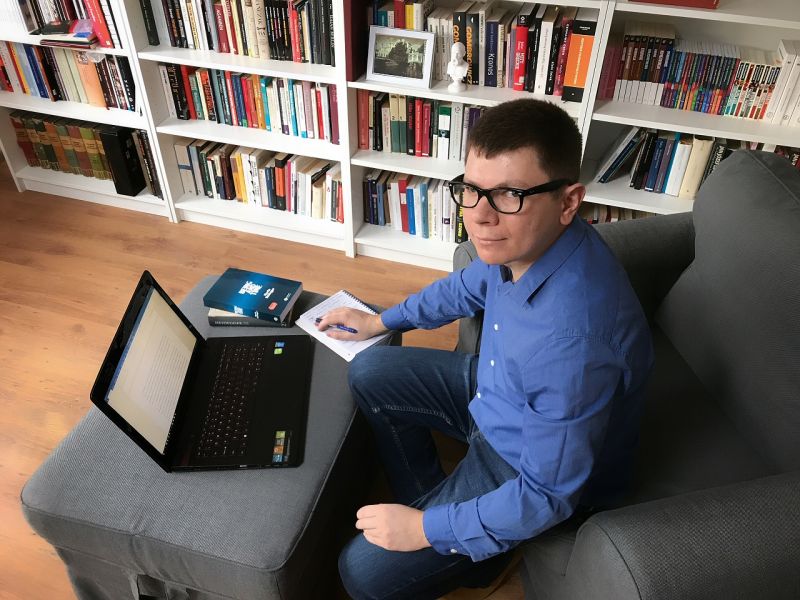With the beginning of February dr Filip Bialy launched his 8-month long academic apprenticeship as a Visiting Fellow at the prestigious London School of Economics and Political Science (LSE). During his stay in the English capital, he will be conducting studies in cooperation with researchers gathered as a part of the Department of Government.
Dr Filip Bialy is an alumnus of the AMU Faculty of Political Science and Journalism and currently studies for his master's degree in Literature (Faculty of Polish and Classical Philology) as well as a postgraduate degree in Big Data (Faculty of Mathematics and Information Technology). His academic interests concern ideologies, methodology of political science, as well a the links between the theory of politics and theory of literature.
How does one go about getting invited to an institution such as the LSE?
Certainly, there are many different ways, depending on the field of study and the relationship between the LSE and your home institution. In my case, it was a matter of rather long individual efforts. After defending my Ph.D. dissertation in November 2017 I knew that the next step in my academic career had to be an apprenticeship abroad. Given that my scientific research was strongly connected to the Anglo-Saxon political theory, my dream country for such an endeavor was Great Britain. Not without the help of my British acquaintances, I submitted a proper application to the LSE. It took almost a year to receive a response, but the application finally went through.
What kind of research will you be conducting during your apprenticeship?
I am a member of a research team, which under the leadership of prof. Janusz Wisniewski from our Faculty is carrying out a project regarding the relation between ideology and study of politics. We are trying to establish how ideology expresses itself in the very construction of basic terms used by political scientists. It is not about accusing scientists of being politically biased, but rather about pointing out that science, which aspires to paint an objective picture of reality, must never cease to control its etymological assumptions. In our research we refer to a number of ideological concepts, most of all the "morphology of terms" suggested by Michael Freeden, all the while adapting it to the examination of the scientific discourse. One of our objectives is to publish a report on our findings in English. It will be the main focus of my stay in London.
Aside from that, as a Literature student, I will also be conducting research on the relationship between political theory and literature. I am especially fascinated by how Sophocles's Antigone was received in philosophy and political theory. Some may be surprised, but it is, in fact, a widely discussed topic nowadays, which is exemplified by the books of Judith Butler, Bonnie Honig or Slavoj Zizek, who in 2016 published his own version of Antigone with three alternative endings.
How is staying in London going to help you in conducting such research?
London, despite the big Brexid confusion, remains one of the most important academic centers of the Western world. The federal London University, which gathers over a dozen autonomic schools and colleges (among others the LSE) is the biggest university in Great Britain, which recruits extraordinary scientists from across the world. It creates a unique opportunity to consult really any scientific subject with world-renowned experts, including for example the abovementioned Michael Freeden, who as a matter of fact visited us in Poznan a few years back.
Approaches that utilize advanced methods of data analysis are getting more and more popular in social sciences. Including those connected to Big Data technologies. My intention is to use techniques such as text mining or machine learning is examining political discourse. LSE launched a completely new major this year called Applied Social Data Science. I intend to open a conversation with the people that contribute to its creation.
One thing that also surely bedazzles any scientist in London is its collection of amazing libraries. LSE runs the British Library of Political and Economic Science, but extensive literature on political science can also be found in the main library of the University of London - Senate House Library, as well as the University College London library.
London is also located quite close to Oxford and Cambridge. I will admit that becoming affiliated with the LSE will open some doors into those institutions as well.
Could you tell me a little bit about the LSE itself?
LSE was founded by the members of the Fabian Society in 1895. It was supposed to embody the Fabian, social-democratic vision of education in social sciences, which were just emerging at the time. However, the LSE professors were extraordinary scholars, representing a wide variety of world views, such as Karl Popper, Ralph Dahrendorf, Michael Oakeshott, Anthony Giddens, Steven Lukes or John Gray. Sevel Nobel Prize winners were affiliated with the LSE. Among others Friedrich von Hayek, Amartya Sen, Bertrand Russell, as well as one of the school's founding fathers, George Bernard Show. LSE is a birthplace of political elites. Over the years it produced countless members of parliament, ministers, heads of state and heads of government from across the world.
In the QS 2019 ranking, which includes over a thousand schools worldwide, LSE took 38th place. As far as social sciences go, it is in the top of the top - usually noted among the top four, next to Oxford, Harvard, and Cambridge.
The Department of Government is the main political science faculty within the LSE framework. It is led by an exquisite political theorist, professor Chandran Kukathas, who authored publications on liberalism and multiculturalism, and who will be mentoring my apprenticeship.
Interview with dr Filip Bialy by Marcin Pera.


